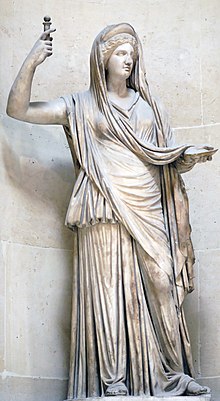Hera (goddess)
| Hera | |
|---|---|
| Goddess of marriage, women, childbirth, and family | |

|
|
| Abode | Mount Olympus |
| Symbol | Pomegranate, peacock feather, diadem, cow, lily, lotus, cuckoo, panther, scepter, throne, lion |
| Mount | Chariot drawn by peacocks |
| Personal information | |
| Consort | Zeus |
| Children | Angelos, Ares, Eileithyia, Enyo, Eris, Hebe, Hephaestus |
| Parents | Cronus and Rhea |
| Siblings | Poseidon, Hades, Demeter, Hestia, Zeus, Chiron |
| Roman equivalent | Juno |
| Etruscan equivalent | Uni |
Hera (/ˈhɛrə, ˈhɪərə/; Greek: Ἥρᾱ, Hērā; Ἥρη, Hērē in Ionic and Homeric Greek) is the goddess of women, marriage, family, and childbirth in Ancient Greek religion and myth, one of the Twelve Olympians and the sister-wife of Zeus. She is the daughter of the Titans Cronus and Rhea. Hera rules over Mount Olympus as queen of the gods. A matronly figure, Hera served as both the patroness and protectress of married women, presiding over weddings and blessing marital unions. One of Hera's defining characteristics is her jealous and vengeful nature against Zeus' numerous lovers and illegitimate offspring, as well as the mortals who cross her.
Hera is commonly seen with the animals she considers sacred including the cow, lion and the peacock. Portrayed as majestic and solemn, often enthroned, and crowned with the polos (a high cylindrical crown worn by several of the Great Goddesses), Hera may hold a pomegranate in her hand, emblem of fertile blood and death and a substitute for the narcotic capsule of the opium poppy. Scholar of Greek mythology Walter Burkert writes in Greek Religion, "Nevertheless, there are memories of an earlier aniconic representation, as a pillar in Argos and as a plank in Samos."
...
Wikipedia
